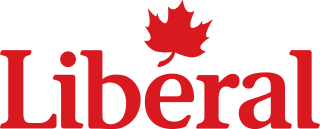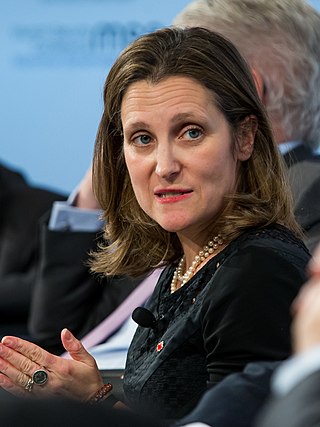
Paul Edgar Philippe Martin, also known as Paul Martin Jr., is a Canadian lawyer and politician who served as the 21st prime minister of Canada and the leader of the Liberal Party of Canada from 2003 to 2006.

The Liberal Party of Canada is a federal political party in Canada. The party espouses the principles of liberalism, and generally sits at the centre to centre-left of the Canadian political spectrum, with their rival, the Conservative Party, positioned to their right and the New Democratic Party, who at times aligned itself with the Liberals during minority governments, positioned to their left. The party is described as "big tent", practising "brokerage politics", attracting support from a broad spectrum of voters. The Liberal Party is the longest-serving and oldest active federal political party in the country, and has dominated federal politics of Canada for much of its history, holding power for almost 70 years of the 20th century. As a result, it has sometimes been referred to as Canada's "natural governing party".

The minister of finance is the minister of the Crown in the Canadian Cabinet, who is responsible for overseeing the Department of Finance and presenting the federal government's budget each year. It is one of the most important positions in the Cabinet.

Justin Pierre James Trudeau is a Canadian politician serving as the 23rd and current prime minister of Canada since 2015 and leader of the Liberal Party since 2013. Trudeau is the second-youngest prime minister in Canadian history after Joe Clark; he is also the first to be the child of a previous holder of the post, as the eldest son of Pierre Trudeau.
Several policies regarding interior and domestic issues in Canada were planned and adopted by the Cabinet of Canadian Prime Minister Stephen Harper, after he came to office as the head of a minority government on February 6, 2006. At the beginning of the government's appointment, five policy priorities were identified in the areas of federal accountability, tax reform, crime, child care and health care.

Christina Alexandra Freeland is a Canadian politician serving as the tenth and current deputy prime minister of Canada since 2019 and the minister of finance since 2020. A member of the Liberal Party, Freeland represents the Toronto riding of University—Rosedale in the House of Commons. She was first appointed to Cabinet following the 2015 federal election and is the first woman to hold the finance portfolio.
The Canadian federal budget for the 2009-2010 fiscal year was presented to the House of Commons of Canada by Finance Minister Jim Flaherty on January 27, 2009. The federal budget included $20 billion in personal income tax cuts as well as major investments in infrastructure.

Canadian public debt, or general government debt, is the liabilities of the government sector. Government gross debt consists of liabilities that are a financial claim that requires payment of interest and/or principal in future. They consist mainly of Treasury bonds, but also include public service employee pension liabilities. Changes in government debt over time reflect primarily borrowing due to past government deficits.

The Canadian federal budget for the 2008-2009 fiscal year was presented to the House of Commons of Canada by Finance Minister Jim Flaherty on February 26, 2008.
The Ontario government debt consists of the liabilities of the Government of Ontario. Approximately 82% of Ontario's debt is in the form of debt securities, while other liabilities include government employee pension plan obligations, loans, and accounts payable. The Ontario Financing Authority, which manages the provinces' debt, says that as of March 31, 2020, the Ontario government's net debt is CDN $353.3 billion. Net debt is projected to rise to $398 billion in 2020-21. The Debt-to-GDP ratio for 2019-2020 was 39.7%, and is projected to rise to 47.1% in 2020-21. Interest on the debt in 2019-20 was CDN$12.5 billion, representing 8.0% of Ontario's revenue and its fourth-largest spending area.
The debt brake is a fiscal rule that was enacted in 2009 in Germany. The law, which is in Article 109, paragraph 3 and Article 115 of the Basic Law, Germany's constitution, is designed to restrict structural budget deficits at the Federal level and limit the issuance of government debt.

Marco Mendicino is a Canadian politician who has been the Minister of Public Safety since October 26, 2021. A member of the Liberal Party, Mendicino represents Eglinton—Lawrence in the House of Commons, sitting as a member of Parliament (MP) since 2015. He was the Minister of Immigration, Refugees and Citizenship from 2019 to 2021.

William Francis Morneau Jr. is a Canadian businessman and former Liberal Party politician who served as minister of finance and member of Parliament (MP) for Toronto Centre from 2015 to 2020.
The Canadian federal budget for fiscal year 2018–2019 was presented to the Canadian House of Commons by Finance Minister Bill Morneau on February 27, 2018 as the omnibus Budget Implementation Act, 2018, No. 1. The deficit was projected to be $18.1 billion, including a $3 billion adjustment for risk. This was later refined to $14.0 billion when the Annual Financial Report of the Government of Canada for Fiscal Year 2018–2019 was released.

The 43rd Canadian Parliament was in session from December 5, 2019, to August 15, 2021, with the membership of its Lower House, the House of Commons of Canada, having been determined by the results of the 2019 federal election held on October 21, 2019. Parliament officially resumed on December 5, 2019, with the election of a new Speaker, Anthony Rota, followed by a Speech from the Throne the following day. On August 15, 2021, Prime Minister Justin Trudeau advised Governor General Mary Simon to dissolve Parliament and issue the writ of election, leading to a 5-week election campaign period for the 2021 federal election.
The Canadian federal budget for the fiscal years of 2020–21 and 2021–22 was presented to the House of Commons by finance minister Chrystia Freeland on 19 April 2021. The Canadian government did not produce a budget in 2020 due to the COVID-19 pandemic. Instead, the government produced a series of economic updates and stimulus plans throughout the year.
The following is a timeline of the COVID-19 pandemic in Canada:
Several policies regarding interior and domestic issues in Canada were planned and adopted by the Canadian Cabinet, chaired by Prime Minister Justin Trudeau, following the October 19, 2015 election of the Liberal Party to a majority of seats in the House of Commons, such as social and environmental policies.

The 44th Canadian Parliament is the session of the Parliament of Canada which began on 22 November 2021, with the membership of the House of Commons, having been determined by the results of the 2021 federal election held on 20 September. Parliament officially resumed on 22 November with the re-election of Speaker Anthony Rota, and the Speech from the Throne read by Governor General Mary Simon the following day.

The Canadian federal budget for the fiscal years of 2023–24 was presented to the House of Commons by Finance Minister Chrystia Freeland on 28 March 2023. The budget was meant to reflect Prime Minister Justin Trudeau's stated policy objective to "make life more affordable for Canadians" while also reducing government expenditures.










